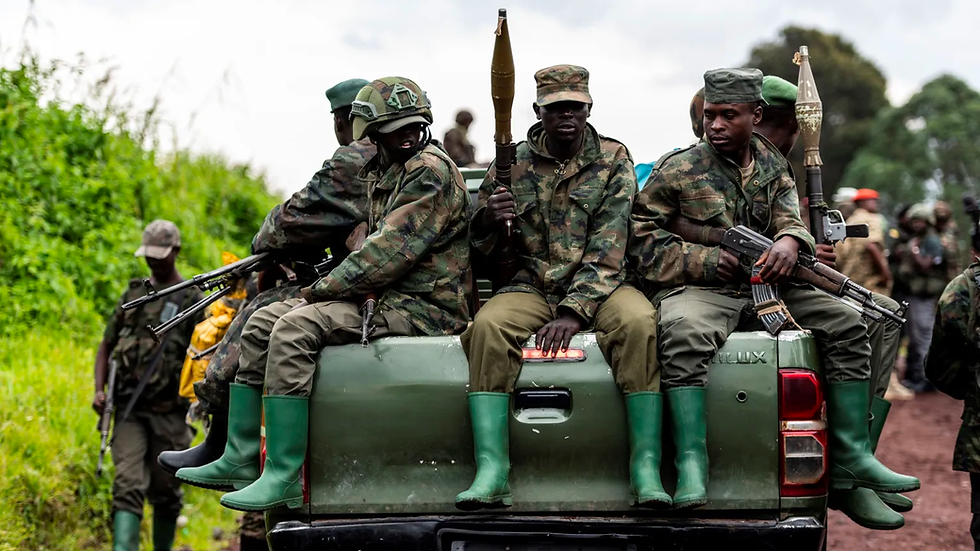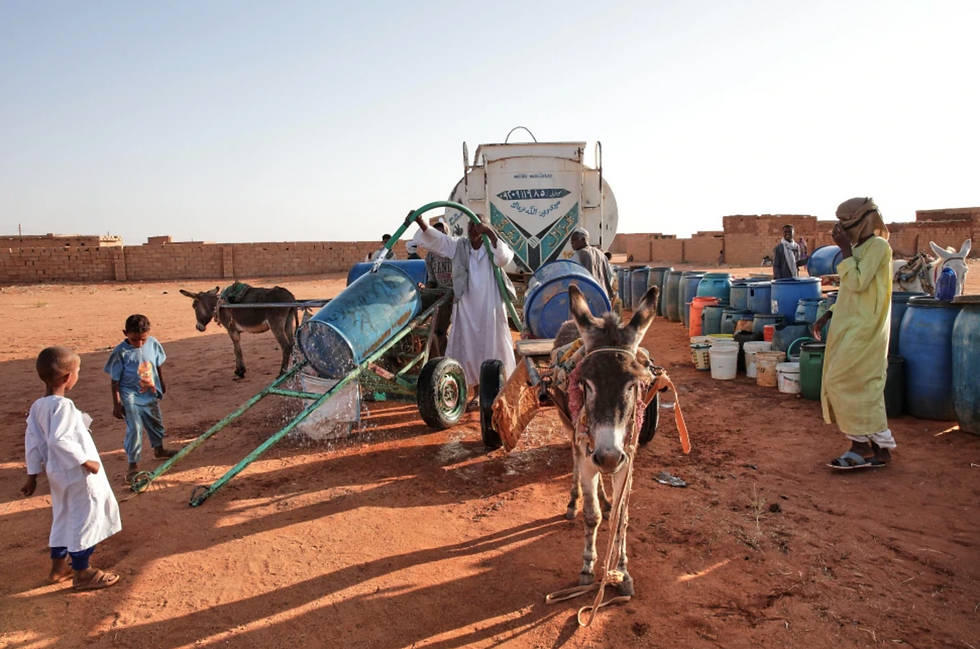The Genocide is Real: The Democratic Republic of the Congo in 2023
- Human Rights Research Center
- Dec 5, 2023
- 7 min read
Author: Dr. Richard Quinlan
December 5, 2023

Much of the world is carefully watching the escalating violence between Israel and Gaza, along with the ongoing tragedy involving Russia’s invasion of Ukraine that has dragged into its second year. However, there is an extraordinary humanitarian crisis occurring in the Democratic Republic of the Congo (DRC) that has driven nearly seven million people from their homes, creating a massive floor of refugees and internally displaced people (IDPs). The tragedy is not garnering global attention, potentially due to the complex history of the region. The crisis can be traced back to the Berlin Conference of November 1884, in which the dominant powers of Europe carved up the continent of Africa without any concern for the peoples living there. Artificial borders and forced cohabitation between long-time enemies created a highly combustible environment for strife that existed long after the age of colonialism faded after the Second World War, and most European colonizers simply granted independence to their former colonies without any guidance as to how to succeed as a free nation.
Understanding even the brief history of the Great Lakes region in Africa helps to put this contemporary agony in proper perspective. The horrors that are taking place in the Congo are not a recent development but are instead the result of well over a century of neglect and animosity that has manifested yet another genocide in one of the world’s most impoverished areas, yet also an area with an astounding number of natural resources. The endgame of the genocide in the Congo seems unclear, but world leaders who are quick to garner attention and funding to aid other areas of the world in need must put forth the same level of intensity concerning the Congo.
M23 and the Foundations of the Violence
At the center of the conflict is an organization known as M23, a reference to the March 23, 2009 peace agreement signed between the Congolese government and the National Congress for the Defense of the People (CNBP), but this peace was short-lived. By 2012, the M23 group began attacking areas throughout eastern Congo with intense violence until a cease-fire was reached in 2013. However, just as the larger scope of African misfortune can be directed back to the Berlin Conference, a more recent eruption of violence lies at the heart of this current wave of atrocities: the Rwandan Genocide of 1994. Approaching the 30th anniversary, the Rwandan genocide was 100 days of slaughter in which it is estimated that between 800,000-1,000,000 people were murdered between April and July, overwhelmingly Tutsi people. The killings played out with knives, machetes, and even farming tools, encouraged by government radio on RTLM (Radio Télévision Libre des Mille Collines) as the world, including the Clinton administration of the United States, stood back and watched, as best explored by Samantha Power, former U.S. Ambassador to the United Nations. In the aftermath of the genocide, nearly two million Hutu fled Rwanda and entered the refugee camps in the Congo; tragically, many of these individuals were Hutu extremists who were directly involved in the killings but did not want to return to their homeland fearing arrest and prosecution for their crimes. As these extremists integrated into the Congolese army, the Rwandan government of Paul Kagame wanted to root out the Hutus who has organized and carried out the genocide in 1994. As tensions intensified, a multi-national war occurred as Rwanda and its allies invaded Zaire (now known as the DRC).
“Africa’s Civil War”
In 1997, 1998, and 2000, fighting spread across the region in what became known as the First and Second Congo War, or “Africa’s Civil War”. Among the nations involved were Rwanda and Uganda fighting against forces in the Congo (formerly Zaire until 1997). The hate generated during those months of fighting has continued to fester, and the DRC finds itself in the midst of unfathomable humanitarian disaster, with the United Nations stating that 6.9 million people are now internally displaced in their home country. Now, the nation is preparing to hold a volatile presidential election in December in which 24 people are competing for office against incumbent Félix Tshisekedi. War, starvation, displacement, attacks on civilians, extrajudicial killings, and heightened political instability has turned the Congo into a land of devastating suffering, yet the global response has been muted. There were some attempts made to push back upon the M23 rebel group when it first emerged as an armed and highly disruptive force in the region under the guise of the UN Organization Stabilization Mission in the DRC (MONUSCO); however, there was widespread evidence that it had direct military ties to Rwanda which armed the group in order to defend the Tutsi population still living in the Congo.
Human Rights Watch has done an extraordinary job of researching and reporting on the mass killings carried out by M23. In a February 2023 report on the violence, one resident of Kishishe noted the following:
“I saw four dead bodies of neighbors next to my house … A bit further in the village, they killed a man of the Shi tribe and covered his body with a blanket to hide him. Nearby, when we got to the market, I saw a neighbor and his wife and son. They killed the two men and left the woman. They moved on and found a house with three men hiding inside. They killed them with their hoes. Then we got to the [Adventist] church, they made everyone come out and executed them. There were maybe around 20 people killed.”
This military connection between M23 and Rwanda significantly dampened the relationship between the two nations. While fragile and largely ineffective ceasefires have been attempted by M23 and the DRC, the attacks upon civilians continue, not just from M23 but from other groups such as the Ugandan-based Allied Democratic Forces. As mass graves continued to be discovered and rape and killing continue in villages such as Bugomba and Kabungu in the Rutshuru territories, there are multiple reasons for the leading nations of the world to step in and minimize the killing. Sadly, economic interests seem to override humanitarian concern.
Money, Resources, and Silence
By some estimates the value of the natural resources of the Congo can be as much as 24 trillion dollars. Such extraordinary economic opportunity has drawn the interest of China, Russia, and the United States, but the actions of these nations take very different forms. The Chinese have a very clear objective in the Congo: use the sale of weapons to construct an intricate relationship of dependency upon China by the Congolese government. In return, the Chinese gain access to the precious metal and other abundant natural resources found within the Congo. The bloodshed continues around them, and in 2022, there was a U.S. human rights commission hearing involving the illegal use of child labor by Chinese companies in the Congo. As China expands its investments in African nations, Russia has also sought to be a more significant presence throughout the continent.
Russia has long sought to enhance its influence in Africa, and the DRC is one such example, along with countries including Mali, Burkina Faso, and the Central African Republic. Beginning in 2018, the DRC and Russia signed a series of agreements that increased Russian military support to the African nation, including the possible, but not confirmed, presence of Wagner Group security forces. Russia also has a trading relationship with the Congo but that was impacted by the Congo’s vote to condemn the invasion of Ukraine and demand an end to the war. Although there is a difference in opinion concerning the ongoing fighting in Ukraine, one similarity between Russia and the Congolese government is a resentment of the West. This has always been a long held position of Putin’s Russia, the Félix Tshisekedi administration is frustrated by the perceived lack of condemnation by the West of M23 and the brutality transpiring within the DRC despite the increase in violence throughout the second half of 2023. How the relationship between Russia will continue to evolve is uncertain, but if the West hopes to minimize the influence Russia is attempting to establish, it must collectively and emphatically condemn the ongoing killing and the sales of Russian-made weapons to the DRC.
The most perplexing relationship involved the United States. The U.S. has a law, Public Law 109456, directly concerning the Democratic Republic of the Congo. Written during the Obama Administration and supported by former President George W. Bush when he took office in 2001, the law allowed the United States to withhold any money or support for nations that are actively destabilizing the Congo. This would apply to Rwanda, but no such action has been taken. Secretary of State Antony Blinken spoke with President Tshisekedi in late May 2023, and according to the Office of the Spokesperson for the Department of State, Blinken, “noted the United States’ calls for Rwanda to end its support for M23 and reiterated the need for all state actors to cease collaboration with the Democratic Forces for the Liberation of Rwanda (FDLR) and other non-state armed groups.” However, to this point, the U.S. only released a statement but has not taken additional steps. Groups ranging from the African Union to the United Nations have discussed the ongoing bloodletting in the Congo without any tangible changes being made. The smoke ascending through the skies of Gaza and Ukraine are of vital importance to the security of the world, as is the stability and prosperity of the continent of Africa. With its immense natural resources, opportunities for technological growth, and potential global leadership, the twenty-first century can belong to Africa. However, if atrocities such as what is occurring in the Congo are allowed to continue unimpeded, millions of innocent people will continue to suffer, and the world will one day raise its eyes and wonder-once again-why people did not do more.
Additional Source
Al-Jazeera, “What’s Driving the Democratic Republic of the Congo’s Deadly Conflict with M23?” https://www.aljazeera.com/program/the-stream/2023/6/20/whats-driving-dr-congos-deadly-conflict-with-m23



